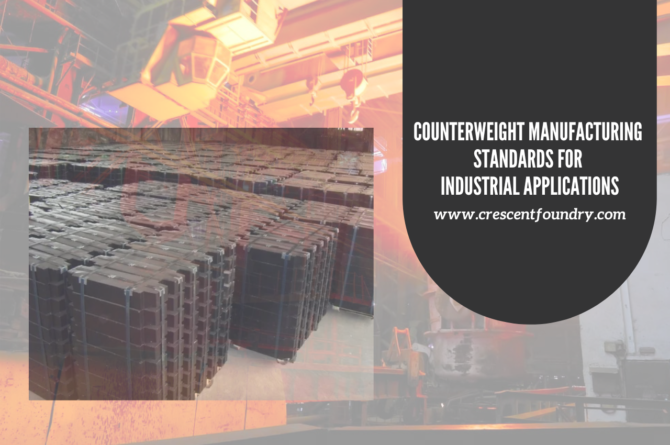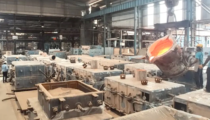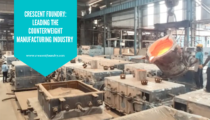When a crane or a truck is being used to…

Counterweight Manufacturing Standards for Industrial Applications
Industries today heavily rely on casting products to operate and function. So much so, that the global casting industry today stands at a market size of 144.38 Billion USD in the year 2021. It is further expected to grow by a CAGR of 5.3% during the 2022 to 2030 period. Counterweights are among the casting products that have witnessed a growth in demand. However, with more players in the market, determining the quality can be difficult. Leading counterweight manufacturers in India offer solutions that are at par with global standards when it comes to quality.
What Are Counterweights and Why Is Maintaining Superior Quality Essential?
Counterweights are used to balance and stabilise objects or structures. They are especially important in industrial applications, where they can be used to balance heavy machinery or other equipment. There is more than one reason why counterweights should maintain certain quality parameters while being manufactured. Here are some:
- Improved safety: Cranes on construction sites are a common sight, especially in rapidly developing urban regions. Such situations make it extremely important for the counterweights to be of standard quality. Counterweights can help to prevent accidents and injuries by helping to balance and stabilise heavy machinery and other equipment.
- Increased efficiency: Top counterweight manufacturers In India offer quality products so that they make the equipment they are attached to, balanced and stable – increasing efficiency and reducing downtime.
- Reduced wear and tear: Balanced equipment is less likely to vibrate or move unexpectedly when functioning. This can reduce wear and tear on the equipment and extend its lifespan.
- Cost-effectiveness: By improving safety, efficiency, and the lifespan of equipment, counterweights can offer value for money in the long run.
What To Consider Before Choosing Counterweights?
Best counterweight manufacturers in India recommend evaluating certain parameters before choosing counterweights.
- The Weight: The weight of the counterweight should be carefully calculated to ensure that it is sufficient to balance and stabilise the equipment it is being used with. If the counterweight is too light, it will not provide enough balance. Improperly balanced equipment entirely defeats the purpose of installing a counterweight.On the other hand, if the counterweight is too heavy, it may cause the equipment to be overbalanced, which can also be unsafe. Therefore, before choosing a particular load (weight) it is important to carefully calculate the weight of the counterweight. That ensures sufficient balance to stabilise the equipment it is attached to, without being too heavy.
- The Measurements: The size of the counterweight should be appropriate for the equipment it is being used with. Leading counterweight manufacturers recommend choosing the right measurement to facilitate ease of operation. The size of the counterweight is important because it determines whether the counterweight will fit properly on the equipment it is being used with.If the counterweight is too small, it may not provide sufficient balance and the equipment may still be unstable. Therefore, it is important to choose a counterweight that is the appropriate size for the equipment it is being used with.
- The Material: The material of the counterweight should be able to withstand the conditions it will be exposed to, such as temperature and humidity. It should also be durable and long-lasting. The material of the counterweight is important because it determines its durability and performance of the counterweight. It is important to choose a material that is suitable for the specific application and will perform well over time.For example, a counterweight used in an outdoor application may need to be made from a material that is resistant to rust and corrosion. Most commonly, cast iron is used to make counterweights since it is durable and appropriate for industrial usage. By choosing the right material for the counterweight, you can ensure that it will perform well and offer value for money.
- The Compatibility: Counterweights should be compatible with the equipment used – including any mounting or attachment hardware. It is essential to identify factors such as the size and shape of the counterweight. Now, why is it essential? If the counterweight is not compatible with the equipment, it may not provide sufficient balance or stability. Or worse, it may be difficult or impossible to attach. Therefore, checking compatibility is of prime importance to avoid any issues with performance.
- The Safety: Counterweights can be heavy and can potentially cause injuries if they are not handled properly. As a result of which, safety is of prime importance in industrial applications. It is also important to ensure that the counterweight is properly mounted or attached to the equipment to prevent it from falling or shifting during use. The counterweight should be safe to use and should not pose any risk/threat of injury to operators or bystanders.
- The Cost: The cost of the counterweight should be considered, as well as any ongoing maintenance costs. The cost of the counterweight is important because it can have a significant impact on the budget of a project or operation. Counterweights can vary in price depending on factors such as size, material, and manufacturer. In addition, it is important to consider any ongoing maintenance costs that may be associated with the counterweight.
It is important for manufacturers of counterweights for industrial applications to follow quality and safety regulations, and other relevant standards to ensure that the products delivered are of optimum quality. It is always best to consider purchasing from the best counterweight manufacturers in India to get the finest quality and best value for money.





